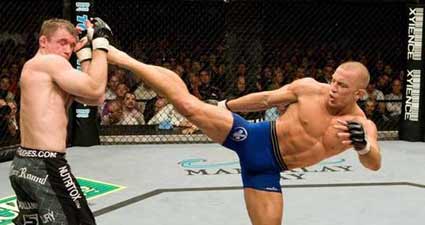McGuinty continues to miss out on mixed martial arts
One of the leading sports issues in Ontario came to the fore Wednesday when Premier Dalton McGuinty said that the legalisation of mixed martial arts in the province is not a priority for his government.
This is the latest development in what has been a seemingly interminable struggle. Ultimate Fighting Championship’s president Dana White has lobbying for the introduction of MMA prize fights into the province, while Ontario Athletic Commissioner Ken Hayashi has stymied him.
"We have higher priorities when it comes to developing [potential] jobs and strengthening the economy," said McGuinty on Wednesday, effectively tabling the debate in Ontario for the foreseeable future.
Although it’s a setback for the pro-MMA camp, they have time, logic and money on their side. Even a cursory examination of the facts makes it clear that hosting a UFC event in Toronto would be easy to arrange, safe for fans and athletes as well as a financial boon to the city’s tourism industry.
Although Premier McGuinty makes it sound like it would be a Herculean task to overturn the Criminal Code’s law against prize fighting, it’s really not an insurmountable problem.
Nova Scotia, Quebec and Manitoba have all approved the staging of these cards, as have municipal athletic commissions in Calgary, Edmonton, Prince George, B.C., and several other B.C. communities also sanction MMA events.
In theory, the Ontario Athletic Commission could override the law simply by approving an MMA event. However, Hayashi firmly believes that he would be charged with assault if he did that, and so UFC fans shouldn’t hold their breath.
Instead the Ontario government could conduct a thorough examination of the issue, much like the one undertaken by Vancouver’s City Council in December. In that case it only took city staff took a few months to put together a comprehensive report that came out in favour of MMA events.
Chris Parry of the Vancouver Sun highlighted most of the pertinent details, but the passage that sticks out is the section on safety:
“Injury rates in MMA competitions have been examined in several studies. The most extensive of these is a 2008 study published in the British Journal of Sports Medicine that examined injuries to fighters in sanctioned bouts in Nevada State between 2002 and 2007. That study concluded that injury rates in regulated professional MMA competitions are similar to rates in other combat sports and that the overall risk of critical sports-related injury appears low. The report notes that a majority of MMA sanctioned bouts end via decision or submission (surrender of one fighter). This is thought to help explain the lower incidence of knockouts in MMA compared to boxing [Bledsoe et al, 2005]. A comparison of injury rates in MMA and boxing is shown in Table 1.”
Table 1 then contrasts boxing and MMA injuries:
“Overall injuries per 100 fight exposures: MMA 23.6, boxing 17.1 to 25
Concussion rate per 100 fight exposures: MMA 1.65, boxing 5.6
% fight ends in knockouts: MMA 3.3%, boxing 11.3%”
Clearly, if boxing is safe enough for Ontario, then MMA should be as well.
Then there’s the money: It’s expected that a major MMA event in Toronto (likely organized by the UFC) would generate millions of dollars in revenue for the cash-strapped province. Tax money and the usual influx of currency for hotels, restaurants and other trappings that stem from tourism would all stimulate the economy.
Granted, there’s always the possibility that a major sporting event will flop and not draw as well as it’s supposed to. However, Ontario as a whole is one of the biggest markets for MMA pay-per-view buys and the city of Toronto, with one of the larger populations in North America, could easily play host to a successful card.
So what’s the hold up? Political will.
McGuinty first said he’d consider the sanctioning of mixed martial arts months ago. Although he did see a swell of support for the move, it probably wasn’t enough to push the project forward.
Like most sporting events, including the Olympics and World Cup, no one can exactly predict what kind of an impact an event like a major pay-per-view will do for a city or province, and that kind of uncertainty is not attractive to an embattled premier.
It’s his loss. The debut of mixed martial arts in Ontario is inevitable. It’s too safe, popular and financially viable to be denied for long. It will happen eventually and McGuinty might as well be on board when it happens.

November 20th, 2010 - 00:54
Clearly the ultimate in boxing is to win by Knock out and the body’s natural defense system upon being hit precisely on the chin or temple is for the fighter to go down. If the boxer does not beat the count of 10, they are counted out and it is officially a KO. This does not necessarily mean that the fighter is knocked out, but just that they could not get up by the count of 10 ready and willing to fight.
The issue with MMA is not the grappling and so forth, because in effect, this is the most skillful part of MMA, it’s the elbowing, ground and pounding on the canvas. This is where the barbaric nature of MMA comes into play. An opponent might already be out, but might sustain two, three, or four further elbows to the head before a referee can step in to stop the fight.
There might be a lower incidence of concussions and so forth in MMA, but there could be far serious injuries down the road.
Boxing is a brutal sport and one only realizes it’s long term effects as a result of the sport being around for so long. MMA is still in it’s infancy and we really do not know the long term effects as of yet!